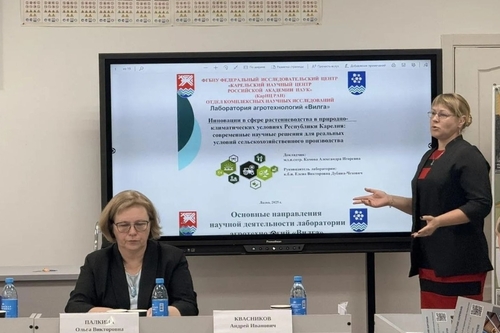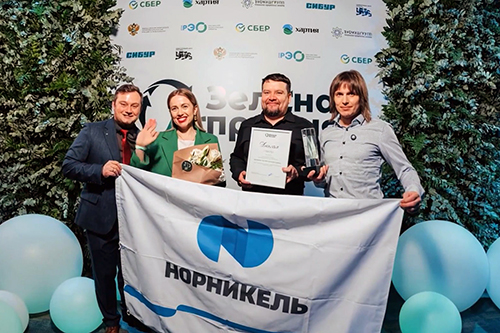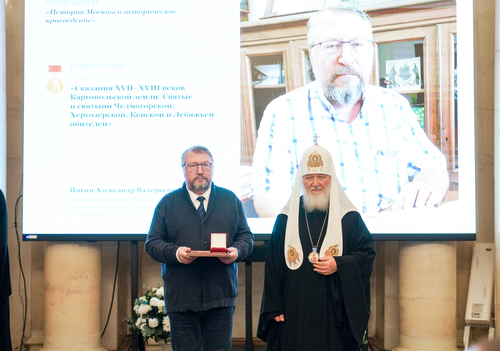The ratio between economic efficiency and fairness is recognized as a 21st century problem. What is efficient is not always fair. Ensuring environmental quality incurs two types of costs. The first one is related to abandoning resources and techniques that are less environmentally friendly but cheaper and have a high performance factor. The second type arises from the need to eliminate the environmental damage: recycling wastes, trapping emissions.
A key role in making green companies more efficient belongs to basic research. Institute of Economics KarRC RAS carries out a range of such studies. Whether the green transformation of the business will raise or diminish the level of fairness in the economy was studied by Valentina Karginova-Gubinova, Senior Researcher at the Department of Regional Economic Policy, Institute of Economics KarRC RAS.
At KarRC RAS Learned Council session on November 28th, the economist gave a talk on “Changes in the efficiency and fairness of production and economic activities in the process of green transition”. The researcher assessed the efficiency of greening 161 companies in various industries. Statistical indicators, financial and non-financial corporate reporting, press releases, data from the Moscow Exchange and information resources of credit institutions, as well as materials from a sociological survey conducted in August - October 2022 were analyzed. Econometric methods and mathematical analysis were used in the study.
— The results of the calculations show that during the past nine years the economic performance of companies was not a significant determinant of their green transformation. It was undertaken only if economically expedient. In general, greening reduces the efficiency of the economic system, increases government costs of supporting green companies, raises prices for consumers, and adds new infrastructure costs. Greening costs can be reduced through formal and informal institutional arrangements, but the key role in making green companies more efficient belongs to basic research designed to create persistent positive expectations of greening. Since green actions involve financial losses, improvements in green technologies, tax incentives, state and municipal guarantees and subsidies are needed to ensure fairness, — the author of the study told.
The results were published in leading Russian and foreign journals. A number of proposals were submitted to federal and regional government agencies, the Federal State Statistics Service, and the Commission on Environment and Sustainable Development of the Civic Chamber of the Russian Federation.
— A number of carbon-related studies are underway at the Karelian Research Centre RAS. Adding the economic perspective to them would be great. I suggest continuing through joint discussion of research results on the carbon agenda with the Department for Interdisciplinary Research, Forest Research Institute, and Institute of Biology KarRC RAS to evaluate the economic prospects of the developments. And I certainly recommend giving this talk at events dedicated to the carbon agenda, — summed up KarRC RAS Director General Olga Bakhmet.

Elena Soini, Leading Researcher, Institute of Linguistics, Literature and History KarRC RAS
The second lecture at the Learned Council session dealt with the analysis of the image of stone in Finnish post-war modernism lyrics. It was given by Elena Soini, Leading Researcher, Institute of Linguistics, Literature and History KarRC RAS.
The image of stone is constantly present in the poetry, bylinas, epics, and fine art of peoples living in the North. In Finnish poetry, it is one of the most persistent and pivotal images. By invoking this image, poets link the modern perception of the world with mythological ideas.
— Spiritualization of stone is one of the key features of Finnish poetry. The poetess Aila Meriluoto embraces the image of stone and identifies herself with it, creating a series of stone images: "the stone God", "the stone truth", "the stone humankind". The writer Ralf Nordgren treats the stone contemplatively, taking the position of an onlooker. The stone of the mind, which appears in the poetry of Lassi Nummi, proves to be too heavy for man. Late in the 20th century, some poets add to the "collection" of stones, while others reject it altogether. The poets enrich the traditional mythological worldview with new shades of feelings and new meanings, — told Elena Soini.
The image of stone in Finnish poetry is multifaceted and controversial, evolving from the serious to the humorous.
— November 27 was the hundredth anniversary of the birth of the famous researcher of literature Eino Karhu, who pioneered the systematic study of Finnish and Karelian literature in our country. His outstanding studies end in the 1970s. Our work is a first attempt to comprehend the current literature, which has not yet been studied, - the researcher added.
The lecture sparked an interesting discussion about why it is important for philologists to study images in other cultures.
— To understand the texts of one's own culture, it is necessary to study other languages and texts. This is useful not only for specialists in Finnish literature, but also for those who study our Russian literature. This provides the contrast for a better understanding of the images, — spoke out Alexander Petrov, Senior Researcher at Folklore and Literature Studies Section of the Institute of Linguistics, Literature and History KarRC RAS.

Alexander Petrov, Senior Researcher at Folklore and Literature Studies Section of the Institute of Linguistics, Literature and History KarRC RAS.
Another comment from the audience was about the usefulness of studying images in literature for students of history, because through poetry, changes in milieu and society can be traced.
The session also discussed other issues, including the approval of the results of calculating the scientific performance of young researchers who apply for housing certificates.














